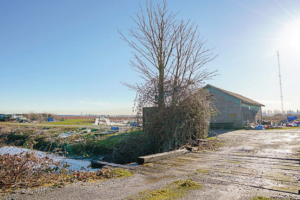
Most lawyers would not be surprised with the 2007 American Bar Association survey cited in The Happy Lawyer, which found that 55% of lawyers are not happy with their careers. Indeed, in British Columbia, out of all women called to the bar in 2003, only 66% of them were still practicing law in 2008, and only 80% of their male counterparts remained practicing.
Therefore, one can conclude that many lawyers are leaving the practice of law because it makes them unhappy, and out of the people still practicing law, many of them are practicing unhappily. What a frightening state of affairs that we must confront within ourselves as we contemplate our own happiness as lawyers!
I made the conscious decision 5 years ago that in order for me to be happy as a lawyer I would have to practice law “outside the box”. This was not surprising because I have never fit neatly into any stereotype or personality matrix in which society would have me categorized.
My decision to go out on my own to practice law came out of the 2009 financial crisis. I was not hired back as an articled student, and no one I wanted to work with would hire me as an Associate. After dealing with the disappointment and despair of being consistently rejected for jobs that I thought I wanted, I realized that my entrepreneurial spirit and need for autonomy would have never allowed me to be happy if I worked as an employee for someone else. I wanted to be able to have the creativity to create my own brand (Onyx Law), set my own hours, choose my own clients, and ultimately have the freedom to practice law and become the lawyer that I aspired to be according to my core values of integrity, competence and passion for justice.
Armed with my business degree and a keen interest in and working knowledge of estate litigation, I decided I wanted to build a niche practice in estate litigation as a sole practitioner, running a virtual law practice (i.e. I rented office space from a law firm once a week to meet clients and get my bookkeeping done), all while practicing out of the comfort of my parents’ basement and wearing pajamas the other four days of the week.
With dogged determination, I approached my now mentor of 6 years, Trevor Todd (who is a leading estate litigator and regular columnist of the Verdict) to forge a mentorship referral relationship that would ultimately allow me to achieve my goal of building a successful estate litigation practice. Trevor and I worked out an unusual but practical arrangement of me paying him a mentorship and referral fee in exchange for his mentorship and referral work. In one fell swoop, I was able to secure a regular source of quality work in estate litigation and the mentorship support to be able to actually run the files. Thanks to Trevor’s tutelage over the years in estate litigation, negotiation, business practice, client management and tactics to deal with opposing counsel, I was given the perfect supportive environment to blossom as a lawyer and business owner while practicing law under my own brand of Onyx Law.
The mentorship and business relationship that I was able to forge with Trevor has been completely symbiotic. It has allowed me to develop into the lawyer I want to be, and build the kind of practice that gets me excited to go to work. It has also allowed Trevor to be reinvigorated after 42 years of practice to still love the law and to profit from having consistent junior support in his practice without ever paying the overhead associated with having an employee.
Forging the mentorship business relationship with Trevor quickly gave me more work than I could handle on my own, so I moved into an office-sharing arrangement where I hired my first paralegal to support my practice. A year later, another lawyer mentor of mine, Judith Janzen, approached me to join forces to make Onyx Law into a boutique family law and estate litigation law firm that would be known for its good work, and for inspiring young lawyers to stay in the practice of law by providing them with effective mentorship and a supportive work environment. Today, Onyx Law Group is a bustling boutique law firm that has mentored and brought into the practice of law 4 lawyers, and is a firm of happy lawyers and support staff (at least on most days!).
But “all work and no play makes Jack a dull boy”, as aptly put by Jack Nicholson’s deranged character in the movie, The Shining. While I loved practicing law at Onyx, and truly enjoyed my life as a lawyer, I still had other goals and aspirations for my life. My husband and I had the joint dream of taking a year off to travel and volunteer in Latin America – to see the world and to serve the less fortunate, and we both worked hard to make this dream come true last year. I affectionately coined our year off as my “non-sabbatical” because a sabbatical implies that you stop working at your normal job during your time off. Such was not the case for me because I was remotely managing my practice and Onyx as a firm, working closing with my Associates, support staff, and Judith the entire time I was away. I leveraged technology by having remote access to the server, and maintaining regular contact via email and Skype conference calls with the firm, and with some clients. I also participated in mediations via Skype throughout the year to successfully settle many matters, all with my Associates and Trevor in attendance. I worked, on average, about 10 to 30 hours a week remotely, the entire time I was in Latin America.
My non-sabbatical in Latin America consisted of many different types of rewarding activities, including five months of travelling to the Galapagos Islands, South America and Central America; four months volunteering at VisionFund Ecuador , a microfinance institution in Ibarra, Ecuador; and three months setting up our very own not-for-profit educational institution called “Uno a Uno” in Cotacachi, Ecuador as a Rose Charities Canada project (see our webpage at http://www.rosecanada.info/projects/ecuador-uno-a-uno/ for more information). During the course of my non-sabbatical, I improved my Spanish from only being able to order food to being able to negotiate with the mayor’s office for free space to hold English and tutoring classes for Uno a Uno.
The non-sabbatical year was filled with eye-opening and enriching experiences. The travelling portions were a treat because we were able to enjoy a great diversity of historical, cultural, and nature experiences such as snorkeling with giant sea turtles, touring ancient Mayan and Incan ruins, exploring tropical rainforests and trekking through the Colca Canyon. Volunteering at the microfinance institution exposed us to the developing world in a real and tangible way. We were able to get a glimpse of how the locals lived, and to forge lasting friendships with many of them. It was from this base of knowledge and social network that my husband and I decided to set up Uno a Uno, which will be dedicated to helping to eradicate poverty through the provision of education to the locals. Uno a Uno will be offering classes in English to children and adults, and tutoring help for school-age children to help them attain higher levels of education, given that the majority of Ecuadorians only have elementary school education or less. Our hope is to be able to set up an educational institution that we can eventually replicate in other parts of Ecuador and greater Latin America. We are excited about the potential to make a significant and positive impact to those in need in the coming years.
It is my view that in order for lawyers to be happy in our profession, we must first look inward to determine three questions: 1) where am I? 2) where do I want to go? and 3) how do I get there? The question of “where am I?” is the process of taking stock of where you are at in all aspects of your life, at work and at home. The process of considering “where do I want to go?” involves thinking about what will make you happy according to your values, passions, and goals in life. Finally, the question of “how do I get there?” focuses on charting out a practical plan to take you to the place you want to go. It is this part that involves thinking “outside the box”, to think creatively to see what steps you can take to get you to that happy place. This may involve you taking some calculated risks, and doing a lot of planning and background work, but I can speak from experience that these risks have paid off for me.
Ultimately, you are responsible for your own happiness. If you do nothing to determine what will make you happy, and do nothing to adapt or change your situation to ensure the elements are in place to make you happy, you can hardly be surprised that you are miserable. If you are an unhappy lawyer, I invite and encourage you to take the plunge: to look within yourself, and to think outside the box, because happiness truly is within your reach!




